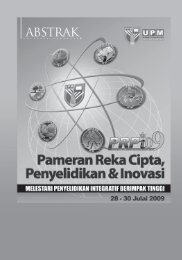BUKU ABSTRAK - Universiti Putra Malaysia
BUKU ABSTRAK - Universiti Putra Malaysia
BUKU ABSTRAK - Universiti Putra Malaysia
Create successful ePaper yourself
Turn your PDF publications into a flip-book with our unique Google optimized e-Paper software.
Social Sciences<br />
Servicescape Failure and Recovery Strategy in the Food Service Industry: How to<br />
Satisfy the Angry Customers?<br />
Dr. Mohhidin Othman<br />
Chua Bee Lia, Boo Huey Chern, Muhammad Shahrim Ab. Karim and Sridar Ramachandran<br />
Faculty of Food Science and Technology, University <strong>Putra</strong> <strong>Malaysia</strong>,<br />
43400 UPM Serdang, Selangor, <strong>Malaysia</strong>.<br />
+603-8946 8363; mohhidin@putra.upm.edu.my<br />
Servicescape has become an increasingly important element in the delivery of customer expectation and delight<br />
in services industry. However, servicescape failure can result in customer dissatisfaction. The subsequent interaction with<br />
a service employee has a great deal of influence on customer ultimate satisfaction. Despite the acknowledged importance<br />
of servicescape, there is a dearth of investigation on servicescape failure and the associated recovery strategy in the food<br />
service industry. This research attempted to offer solutions on how to deal with the angry customers as a result of servicescape<br />
failure. The Critical Incident Technique (CIT) was used to examine servicescape failures and recovery strategies in the food<br />
service industry. In-depth personal interview was applied. The transcription was content analyzed through an inductive sorting<br />
process. The developed classification system was measured by inter-judge reliability and content validity. Using the CIT,<br />
data on 226 servicescape failures and 287 recovery actions were collected from 174 informants. The analysis revealed that<br />
cleanliness issues (76.1%) were the most reported problem in the food service industry, followed by design issues (11.1%),<br />
social interaction issues (7.1%), and functionality issues (5.7%). Customers exhibited negative reactions to those failures with<br />
displaying of emotional and physiological responses. The recovery strategies identified through the sorting process resulting in<br />
five major categories which were empathetic, corrective, compensatory, authority intervention, and no recovery. Combination<br />
of prompt action-oriented responses and sincere empathetic responses was perceived as far more effective and was likely to<br />
meet customer satisfaction, regardless of servicescape failure type. This study has implications for food service practitioners<br />
who are seeking to improve the tangibles in their eateries. It is recommended that food service managers have to closely monitor<br />
the servicescapes and implement appropriate recovery strategies which may greatly affect customer satisfaction. Staff training<br />
is a necessary process in developing efficient service delivery systems.<br />
Keywords: Servicescape failure, recovery strategy, customer satisfaction, food service industry<br />
Relationships between Satisfaction of Muslim Women on Financial Supports After<br />
Divorce and Ex-husbands’ Compliance to the Supports with Post-divorce Welfare<br />
Dr. Muslihah Hasbullah@Abdullah<br />
Najibah Mohd. Zin and Saodah Wok<br />
Faculty of Human Ecology, University <strong>Putra</strong> <strong>Malaysia</strong>,<br />
43400 UPM Serdang, Selangor, <strong>Malaysia</strong>.<br />
+603-8946 7690; muslihah@putra.upm.edu.my<br />
The main objective of this study was to assess the welfare of divorced women relating to financial<br />
supports after divorce i.e., iddah maintenance, mut’ah, arrears of maintenance, and child maintenance. The<br />
specific objectives were to determine the divorced women’s satisfaction with the amount of financial supports;<br />
the ex-husband’s compliance to court-ordered financial supports; satisfaction with post-divorce welfare (level<br />
of economic strain and level of depression); relationships between satisfaction with the amount of financial<br />
supports and post-divorce welfare; and relationships between the ex-husbands’ compliance to court-ordered<br />
financial supports and post-divorce welfare. Data were collected using questionnaire. The samples were 201<br />
divorced women recruited from the recorded cases in the year of 2003 till 2005 in the Shariah Subordinate Courts<br />
of Hulu Langat and Gombak Timur, Selangor. Pearson correlation showed that two factors were negatively<br />
correlated with the economic welfare of the divorced women i.e., the dissatisfaction with the amount of iddah<br />
maintenance, mut’ah, and child maintenance and the ex-husband’s none or partial compliance to court-ordered<br />
iddah maintenance, mut’ah, and child maintenance. However, contrary to expectation, the divorced women’s<br />
satisfaction with the amount of all types of financial supports provided by the ex-husband and their ex-husbands’<br />
none or partial compliance to all types of financial supports were found to have no significant relationships with<br />
depression. Findings indicate that the assessment of a reasonable sum of financial supports and the effective<br />
enforcement of court order are the significant factors that might augment the welfare of women after divorce.<br />
Keywords: Arrears of maintenance, child maintenance, compliance to court order, depression, economic strain, iddah<br />
maintenance, mut’ah, satisfaction<br />
148



